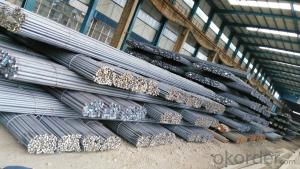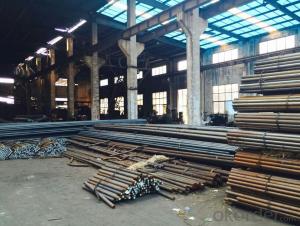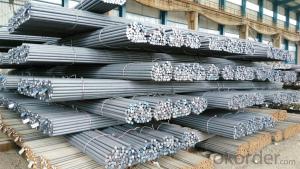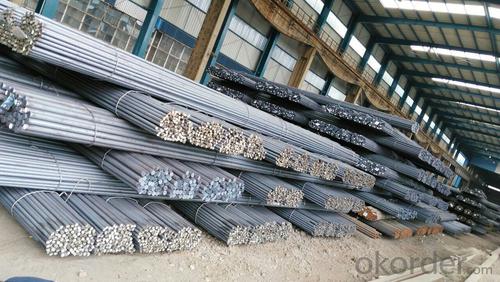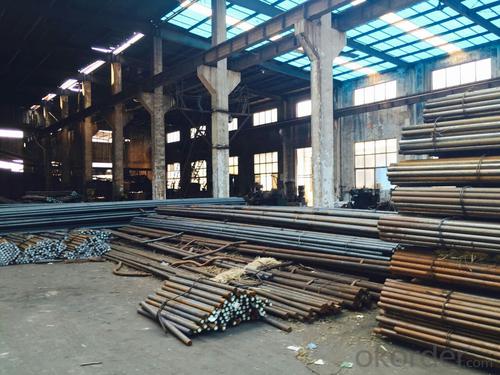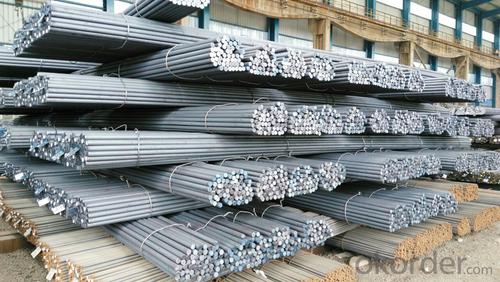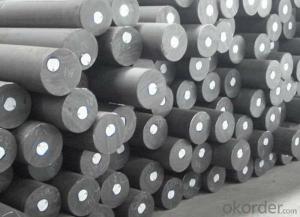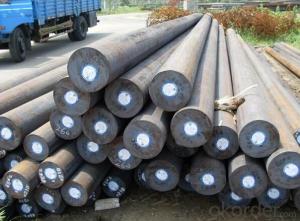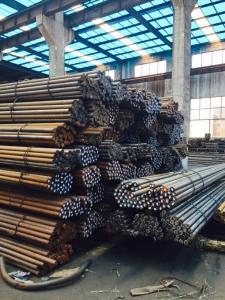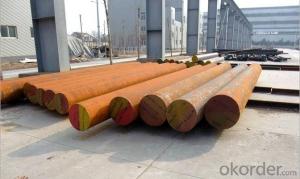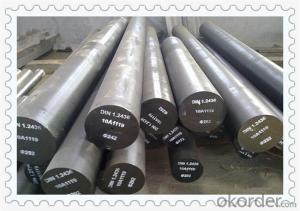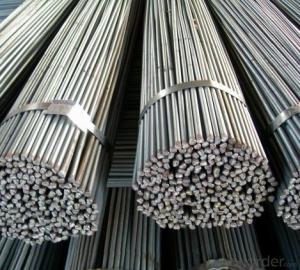Carbon C50 Steel Round Bars Low Carbon Bar
- Loading Port:
- Tianjin
- Payment Terms:
- TT OR LC
- Min Order Qty:
- 25 m.t.
- Supply Capability:
- 50000 m.t./month
OKorder Service Pledge
OKorder Financial Service
You Might Also Like
Specification
Carbon C50 Steel Round Bars Low Carbon Bar
Product details:
Name:Carbon C50 Steel Round Bars Low Carbon Bar
Place of Origin:Liaoning,China Brand Name:Dongbei Tegang
Shape:round bar Material: Alloy Structural Steel
Steel Grade: AISI 1050/JIS S50C/DIN C50/GB 50
Size:Diameter:16mm~300mm
Application:used in making high strengthened and wear resistant parts that works under high pressure, like axle, spring ring, axletree, cam, and steel sling etc.
Chemical Composition:
C | Si | Mn | Cr | Ni | Cu | P | S |
0.47-0.53 | 0.17-0.37 | 0.50-0.80 | ≤0.25 | ≤0.30 | ≤0.35 | ≤0.035 | ≤0.035 |
Characteristics:
- High hardness, strength and toughness.
- Poor plasticity during cold deformation.
- Medium machinability.
- Poor weldability.
- Poor hardenability.
- Cracks is often caused during water quenching process.
- Large parts should be in normalizing treatment.
Application:
S50C structural carbon steel bar /1050 /50/C50 can be used to be manufactured roller, shaft, tyre, spring ring, damping spring, clutch and steel wire rope, etc.
Product Show:
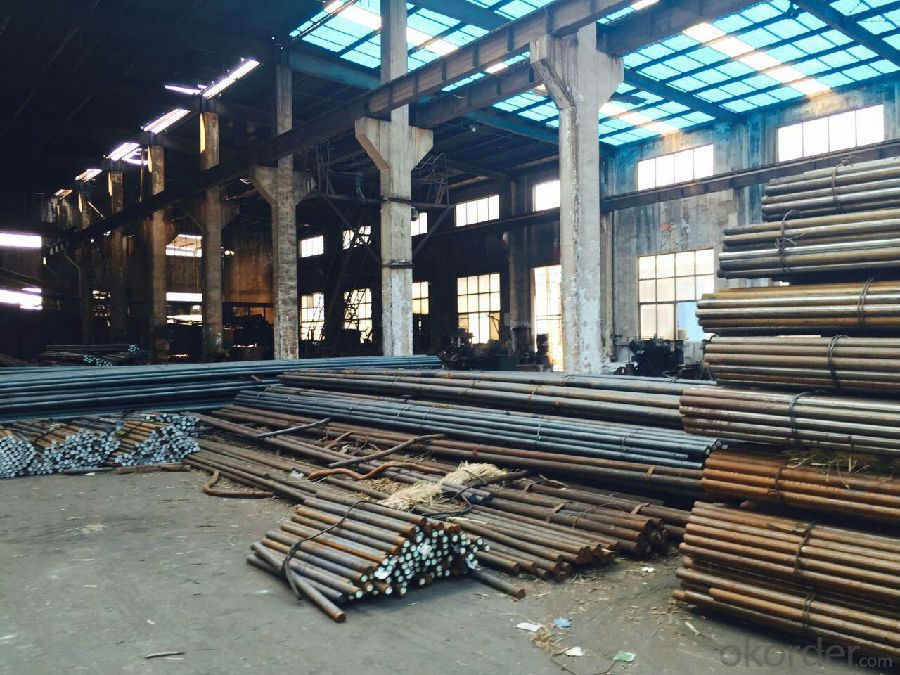
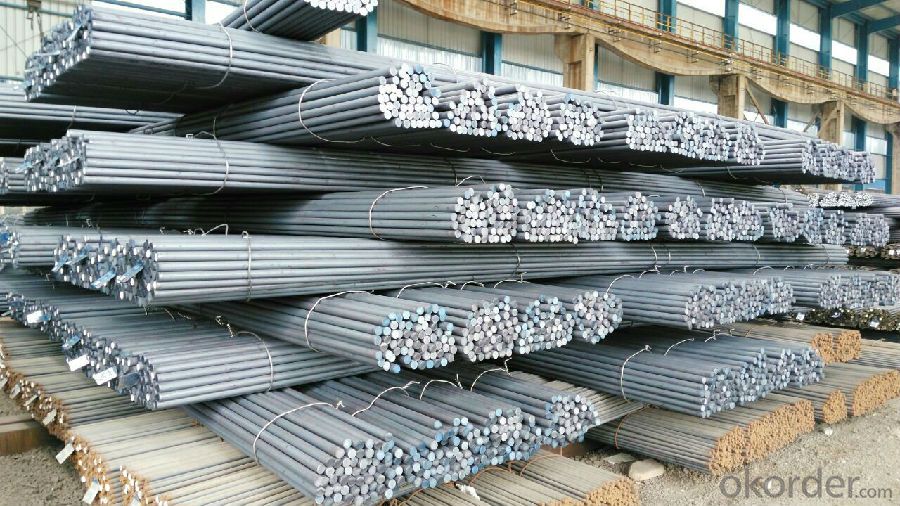
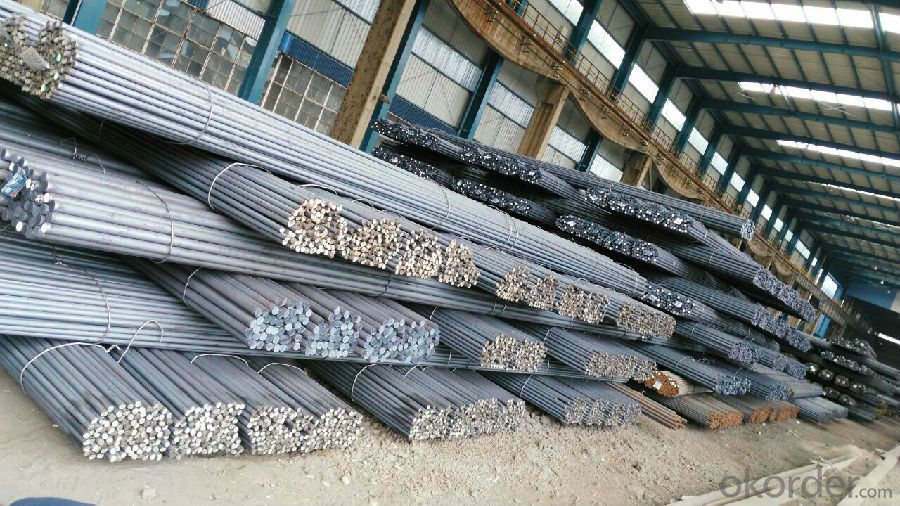
- Q: What is the role of special steel in the defense industry?
- Special steel plays a critical role in the defense industry due to its unique properties and capabilities. One of the primary functions of special steel in defense is to provide strength and durability to various components and structures of military equipment, such as tanks, armored vehicles, naval vessels, and aircraft. These steels are designed to withstand extreme conditions, including high impact and ballistic resistance, making them essential for ensuring the safety and protection of military personnel. Another significant role of special steel in the defense industry is its contribution to the production of cutting-edge weaponry. Special steel alloys are used to manufacture firearms, missiles, and artillery systems, providing the necessary strength, hardness, and corrosion resistance required for such applications. These steels allow for the precise manufacturing of complex weapon systems, ultimately enhancing their performance, accuracy, and reliability. Moreover, special steel also plays a vital role in the defense industry by enabling the development of advanced communication and electronics technologies. Steel alloys with specific magnetic properties are utilized in the production of radar systems, satellite components, and other electronic devices critical for military surveillance, intelligence, and communication purposes. These steels enable the efficient transmission and reception of signals, enhancing the overall capabilities of defense systems. In summary, special steel is indispensable in the defense industry due to its strength, durability, and unique properties. It provides the necessary foundation for the construction of military equipment, enhances the performance of weapons, and enables the development of advanced communication and electronics technologies. By utilizing special steel, the defense industry can ensure the safety, effectiveness, and technological superiority of military operations.
- Q: What are the different methods of surface coloring for special steel?
- Special steel can be colored using several different methods, each with its own purpose and effect. Some common methods include: 1. Heat treatment: This technique involves subjecting the steel to high temperatures, which causes controlled oxidation on the surface. The result is a layer of colored oxide, ranging from golden yellow to deep blue or black. Heat treatment also enhances hardness and corrosion resistance. 2. Electroplating: By immersing the steel in an electrolyte bath with a metal salt solution and passing an electric current through it, metal ions adhere to the surface, creating a thin layer of the desired metal coating. This method allows for a wide range of colors and finishes. 3. Chemical coloring: This process involves using chemical solutions to change the surface color of special steel. Treating the steel with a solution containing specific chemicals, such as oxidizing agents or dyes, can produce various colors and finishes, often used for decorative purposes. 4. Physical Vapor Deposition (PVD): PVD is a technique that deposits thin layers of material onto the steel surface. A solid material is vaporized using a high-energy source and then condensed onto the steel. This allows for the deposition of different materials, resulting in various colors and finishes. PVD coatings are durable, wear-resistant, and aesthetically appealing. 5. Laser marking: Laser marking uses a focused laser beam to create permanent markings or colors on the steel surface. By adjusting laser parameters, such as power and speed, different colors and effects can be achieved. Laser marking is ideal for branding, identification, or decorative purposes due to its precision and ability to create intricate designs. The choice of surface coloring method for special steel depends on factors like desired color, durability, functionality, and cost considerations. Each method has its advantages and limitations, allowing for customization based on specific requirements and preferences.
- Q: How does special steel contribute to the automotive racing industry?
- Special steel plays a crucial role in the automotive racing industry by providing high-performance components and ensuring the safety and reliability of race cars. Its unique properties such as strength, durability, and heat resistance make it ideal for various applications in racing vehicles. One of the main contributions of special steel to the automotive racing industry is its use in the construction of engine parts. Components like crankshafts, camshafts, connecting rods, and valves are subjected to extreme forces and temperatures during racing. Special steel alloys, such as high-strength steels, are specifically designed to withstand these conditions and offer superior performance compared to conventional steel. This allows race car engines to operate at higher speeds, generate more power, and endure intense racing conditions without compromising reliability. Furthermore, special steel is also extensively used in the manufacturing of suspension systems and chassis components. Racing cars are subjected to extreme loads and vibrations while cornering and maneuvering at high speeds. The use of high-strength steel in these critical components enhances the structural integrity of the vehicle, improving stability, handling, and overall performance. In addition to performance benefits, special steel also contributes to the safety of race cars. Safety is of paramount importance in the racing industry, and the use of special steel in roll cages and crash structures provides enhanced protection to drivers in case of accidents. Special steel alloys, such as boron steel, offer exceptional strength and energy absorption capabilities, minimizing the risk of injury during crashes. Moreover, the lightweight nature of special steel allows for the reduction of overall vehicle weight, leading to improved fuel efficiency and better handling. By using advanced steel materials and design techniques, race car manufacturers can achieve a balance between strength and weight, optimizing performance without compromising safety. In summary, special steel plays a vital role in the automotive racing industry by contributing to the performance, safety, and reliability of race cars. Its unique properties allow for the development of high-performance engine parts, suspension systems, and chassis components, enabling race cars to withstand extreme conditions and achieve superior performance on the track. Moreover, special steel enhances the safety of race cars by providing robust crash protection, while also offering weight reduction benefits for improved fuel efficiency and handling.
- Q: How is spring steel used in the automotive industry?
- Spring steel is commonly used in the automotive industry for its ability to withstand high stress and maintain its shape. It is primarily used for manufacturing various suspension components such as springs, stabilizer bars, and torsion bars. These spring steel components provide stability, improve handling, and enhance overall vehicle performance and safety.
- Q: How is free-cutting steel used in the manufacturing of screws and bolts?
- Free-cutting steel is commonly used in the manufacturing of screws and bolts due to its excellent machinability. The steel's composition includes additives such as sulfur, lead, or bismuth, which act as lubricants during the machining process, making it easier to cut and shape the material. This results in a faster and more efficient production of screws and bolts, reducing manufacturing time and costs.
- Q: How does special steel contribute to the renewable energy conversion efficiency?
- Special steel plays a crucial role in enhancing the renewable energy conversion efficiency by providing durability, strength, and resistance to extreme conditions. It is used in the construction of wind turbines, solar panels, and hydropower systems, ensuring their reliability and longevity. Moreover, special steel alloys facilitate the development of more efficient and lightweight components, reducing energy losses and optimizing the overall performance of renewable energy systems.
- Q: What are the requirements for special steel used in nuclear power plants?
- Stringent and critical requirements must be met for the special steel used in nuclear power plants to guarantee the safe and reliable operation of these facilities. Some of the key requirements include: 1. Exceptional strength and durability: The special steel must possess remarkable strength and durability to endure the extreme conditions and stresses found in nuclear power plants, such as high temperatures, pressure, and radiation levels. 2. Corrosion resistance: Corrosion can severely compromise the integrity of steel components in a nuclear power plant. Therefore, the special steel must exhibit high resistance to corrosion, including both general and localized corrosion, such as pitting and crevice corrosion. 3. Low neutron absorption: Neutron absorption plays a crucial role in the performance of reactor core materials in nuclear power plants. Therefore, the special steel used should have low neutron absorption characteristics to minimize interference with neutron flux and avoid any adverse effects on the overall operation and safety of the plant. 4. Radiation resistance: Nuclear power plants generate significant levels of radiation that can affect the properties and performance of materials over time. The special steel must be able to withstand radiation-induced embrittlement, degradation, and other forms of radiation damage, ensuring long-term mechanical integrity. 5. Compliance with regulations: The steel used in nuclear power plants must meet stringent regulatory standards and codes, such as those established by the Nuclear Regulatory Commission (NRC) in the United States or the International Atomic Energy Agency (IAEA) internationally. Compliance with these regulations ensures that the steel meets the necessary safety criteria and has been manufactured and tested to the highest standards. 6. Traceability and documentation: The traceability of the special steel used in nuclear power plants is of utmost importance. It is crucial to maintain comprehensive documentation, including material certifications, test reports, and manufacturing records, to ensure that the quality and origin of the steel can be verified throughout its lifecycle. In summary, the requirements for special steel used in nuclear power plants revolve around its ability to withstand extreme conditions, resist corrosion and radiation, comply with strict regulatory standards, and provide long-term structural integrity. These requirements are essential for the safe and efficient operation of nuclear power plants and the protection of human health and the environment.
- Q: Can special steel be used in the pharmaceutical manufacturing industry?
- Yes, special steel can be used in the pharmaceutical manufacturing industry. Special steel, such as stainless steel, offers excellent corrosion resistance, durability, and cleanability, making it suitable for various applications in pharmaceutical manufacturing, including equipment and machinery used in production, storage, and transportation of pharmaceutical products. Special steel's properties ensure compliance with strict hygiene and quality standards in the industry.
- Q: Is special steel suitable for marine applications?
- Yes, special steel is suitable for marine applications. Special steel, also known as marine grade stainless steel, is specifically designed to withstand the harsh conditions of marine environments. It offers excellent resistance to corrosion, especially in the presence of saltwater, which makes it highly suitable for various marine applications. Special steel contains a higher percentage of chromium and nickel compared to standard steel grades, which enhances its corrosion resistance properties. Additionally, it is often alloyed with molybdenum, titanium, or other elements to further improve its resistance to pitting, crevice corrosion, and chloride-induced stress corrosion cracking. Marine applications require materials that can withstand high levels of moisture, saltwater exposure, and environmental factors like temperature variations and wave impact. Special steel meets these requirements by providing exceptional strength, durability, and corrosion resistance. Some common marine applications that benefit from special steel include shipbuilding, offshore oil and gas platforms, marine equipment and machinery, marine pipelines, and marine architecture and structures. Special steel is also used in the construction of naval vessels, submarines, and offshore wind farms. In conclusion, special steel is highly suitable for marine applications due to its superior corrosion resistance properties, durability, and strength. It effectively withstands the harsh conditions of marine environments and ensures the longevity and reliability of marine structures and equipment.
- Q: What are the key characteristics to consider when selecting special steel?
- There are several key considerations to keep in mind when choosing special steel. Firstly, the composition of the steel is of utmost importance. The elements and their proportions within the alloy play a vital role in determining the steel's properties, such as strength, hardness, and resistance to corrosion. It is essential to carefully assess the intended use and select a composition that aligns with the desired performance. Mechanical properties are another critical aspect to consider. Tensile strength, yield strength, ductility, and toughness all determine how the steel will perform under different loads and impacts. Choosing a steel with appropriate mechanical properties for the specific application is crucial. The steel's heat treatment capabilities should also be taken into account. Special steels often undergo various heat treatment processes to enhance their properties. Factors like hardenability, tempering ability, and the ability to maintain hardness at high temperatures are essential factors to consider when selecting special steel. Corrosion resistance is a significant characteristic, particularly if the steel will be exposed to harsh environments or chemicals. Certain special steels are specifically designed to have excellent resistance to corrosion, making them suitable for applications in marine environments, chemical processing plants, or the oil and gas industries. Other characteristics to consider include machinability, weldability, and cost. Machinability refers to how easily the steel can be cut, drilled, or shaped, while weldability determines the steel's ability to be welded without compromising its properties. Cost is an important factor that should align with the project's budget constraints. To summarize, when choosing special steel, it is crucial to consider the composition, mechanical properties, heat treatment capabilities, corrosion resistance, machinability, weldability, and cost. By assessing these key characteristics in relation to the specific application, one can make an informed decision and select the most suitable special steel for the intended purpose.
Send your message to us
Carbon C50 Steel Round Bars Low Carbon Bar
- Loading Port:
- Tianjin
- Payment Terms:
- TT OR LC
- Min Order Qty:
- 25 m.t.
- Supply Capability:
- 50000 m.t./month
OKorder Service Pledge
OKorder Financial Service
Similar products
Hot products
Hot Searches
Related keywords
